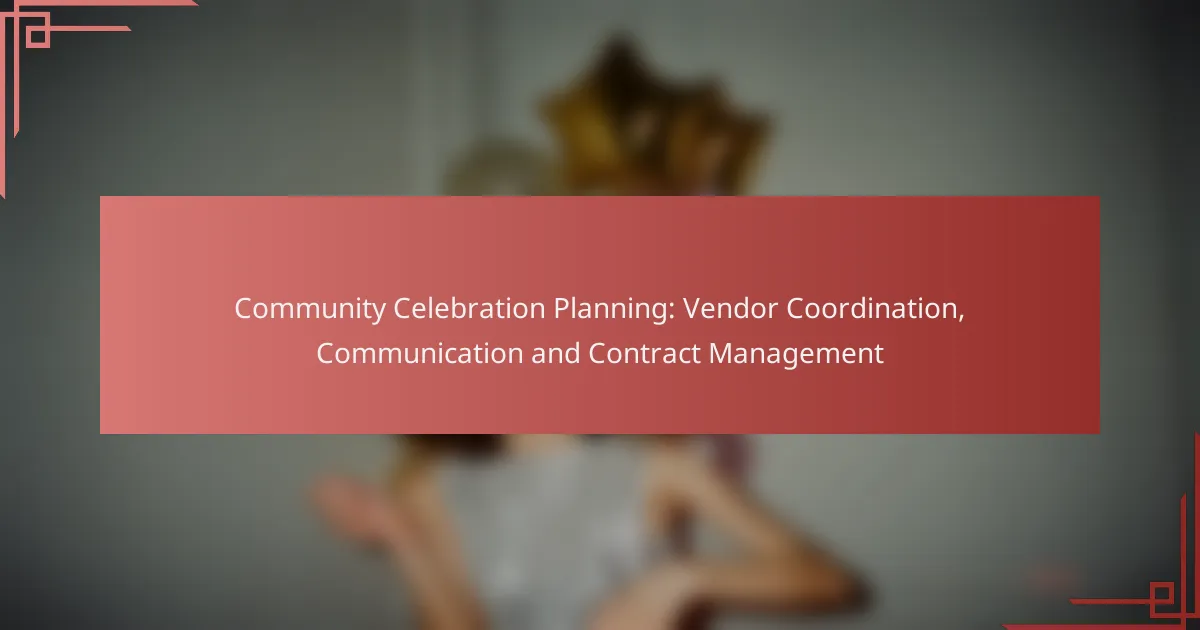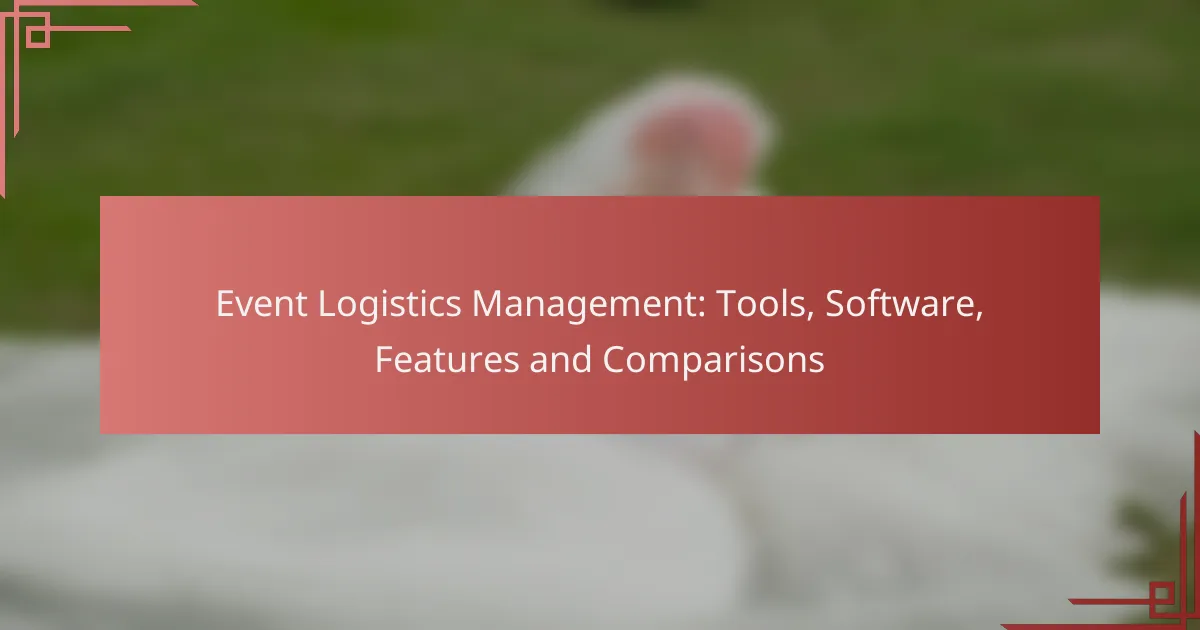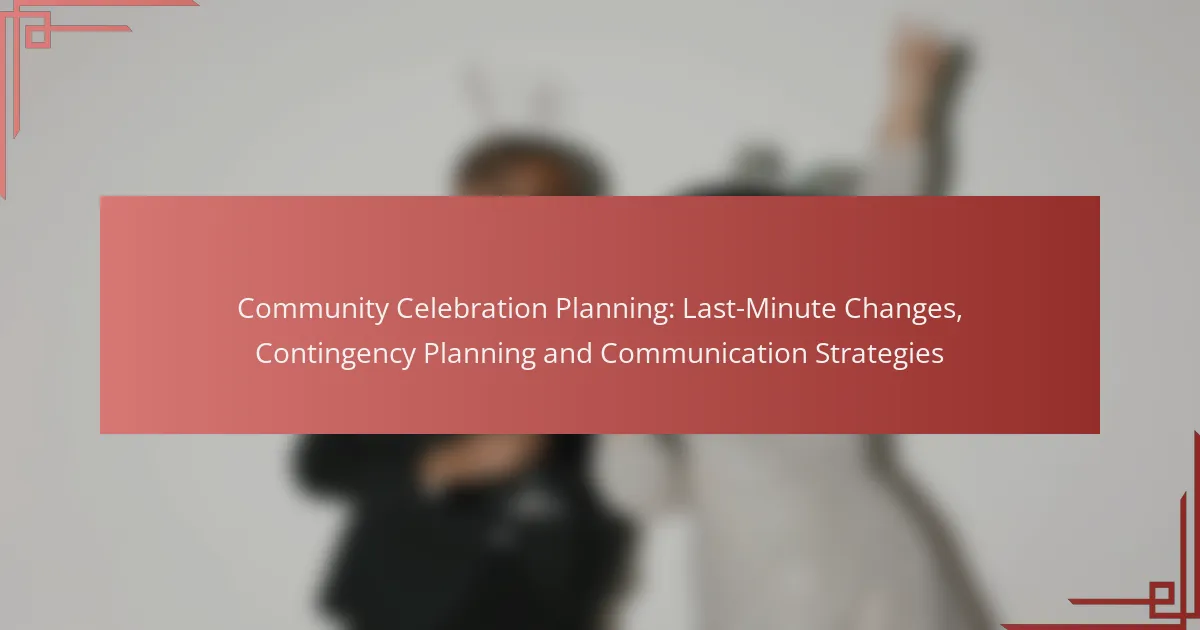Planning a community celebration requires meticulous coordination of various vendors to create a successful event. Effective communication and contract management are crucial, involving the use of collaborative tools and clear briefs to ensure all parties are aligned and satisfied with their roles and responsibilities.
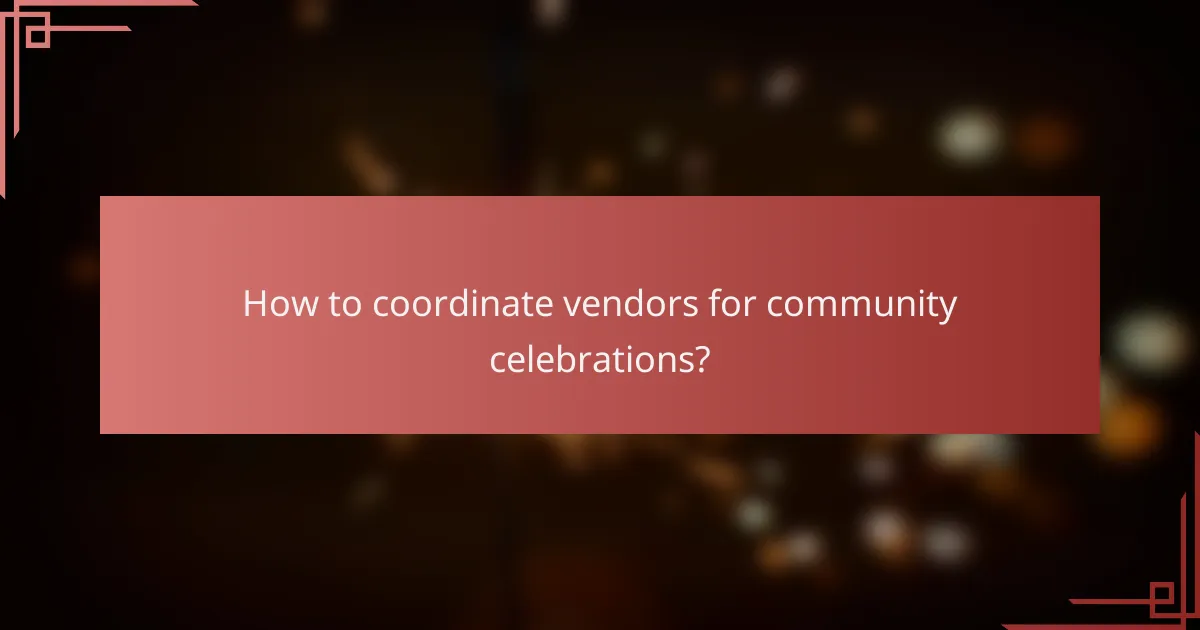
How to coordinate vendors for community celebrations?
Coordinating vendors for community celebrations involves organizing multiple service providers to ensure a seamless event. Effective vendor management requires clear communication, proper tools, and defined roles to facilitate collaboration and meet event goals.
Establish clear communication channels
Clear communication channels are vital for successful vendor coordination. Establish dedicated platforms, such as email threads or project management tools, where all parties can share updates and address concerns promptly.
Consider using group messaging apps for real-time communication, which can enhance responsiveness and reduce misunderstandings. Regularly remind vendors of the preferred communication methods to ensure everyone stays informed.
Use vendor management software
Vendor management software can streamline the coordination process by centralizing information and tasks. These tools often provide features for tracking contracts, payments, and schedules, making it easier to manage multiple vendors simultaneously.
Look for software that allows for document sharing and task assignments, which can improve accountability and transparency. Popular options include platforms like Trello, Asana, or dedicated vendor management systems.
Set timelines and deadlines
Setting clear timelines and deadlines is crucial for keeping vendors on track. Create a detailed timeline that outlines key milestones, such as contract signing, payment schedules, and delivery dates for services or equipment.
Share this timeline with all vendors and encourage them to adhere to it. Regularly review progress and adjust deadlines as necessary to accommodate any unforeseen challenges while maintaining overall event goals.
Conduct regular check-ins
Regular check-ins with vendors help to ensure that everyone is aligned and any issues are addressed promptly. Schedule weekly or bi-weekly meetings leading up to the event to discuss progress, challenges, and any adjustments needed.
During these check-ins, encourage open dialogue and feedback. This proactive approach can prevent last-minute surprises and foster a collaborative atmosphere among vendors.
Define roles and responsibilities
Clearly defining roles and responsibilities among vendors is essential for smooth operations. Create a detailed list of each vendor’s tasks and expectations, ensuring that everyone knows their specific contributions to the event.
Consider using a shared document or spreadsheet to outline these roles, which can be updated as needed. This clarity helps prevent overlap and ensures that all aspects of the celebration are covered effectively.
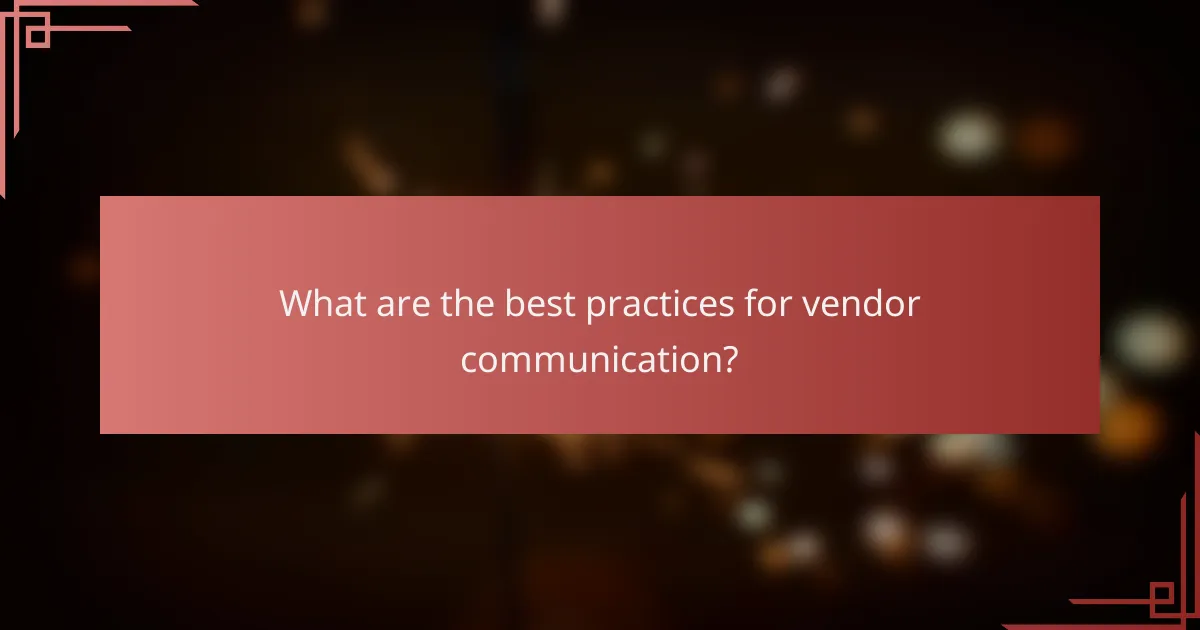
What are the best practices for vendor communication?
Effective vendor communication is essential for successful community celebrations. Best practices include utilizing collaborative tools, maintaining a centralized information hub, providing clear briefs, and encouraging open dialogue.
Utilize collaborative tools like Slack
Using collaborative tools such as Slack can streamline communication with vendors. These platforms allow for real-time messaging, file sharing, and organized channels for different topics, making it easier to keep everyone on the same page.
Consider creating dedicated channels for specific events or tasks. This helps in reducing clutter and ensures that important information is easily accessible to all relevant parties.
Maintain a centralized information hub
A centralized information hub is crucial for managing vendor details, contracts, and schedules. Tools like Google Drive or project management software can serve as a repository for all essential documents, making it easy for vendors to find what they need.
Ensure that all updates are reflected in this hub promptly. This practice minimizes confusion and ensures that everyone has access to the latest information, which is vital for smooth operations.
Provide detailed briefs and expectations
Providing vendors with detailed briefs is key to aligning their services with your event goals. Include specifics such as timelines, deliverables, and any unique requirements to avoid misunderstandings.
Consider using templates for briefs to ensure consistency. This can help vendors understand what is expected and reduce the likelihood of errors or miscommunication.
Encourage feedback and open dialogue
Encouraging feedback and open dialogue fosters a collaborative atmosphere. Regular check-ins can help identify potential issues early and allow for adjustments before they escalate.
Establish a culture where vendors feel comfortable sharing their insights or concerns. This not only improves the working relationship but can also lead to innovative solutions that enhance the overall event experience.
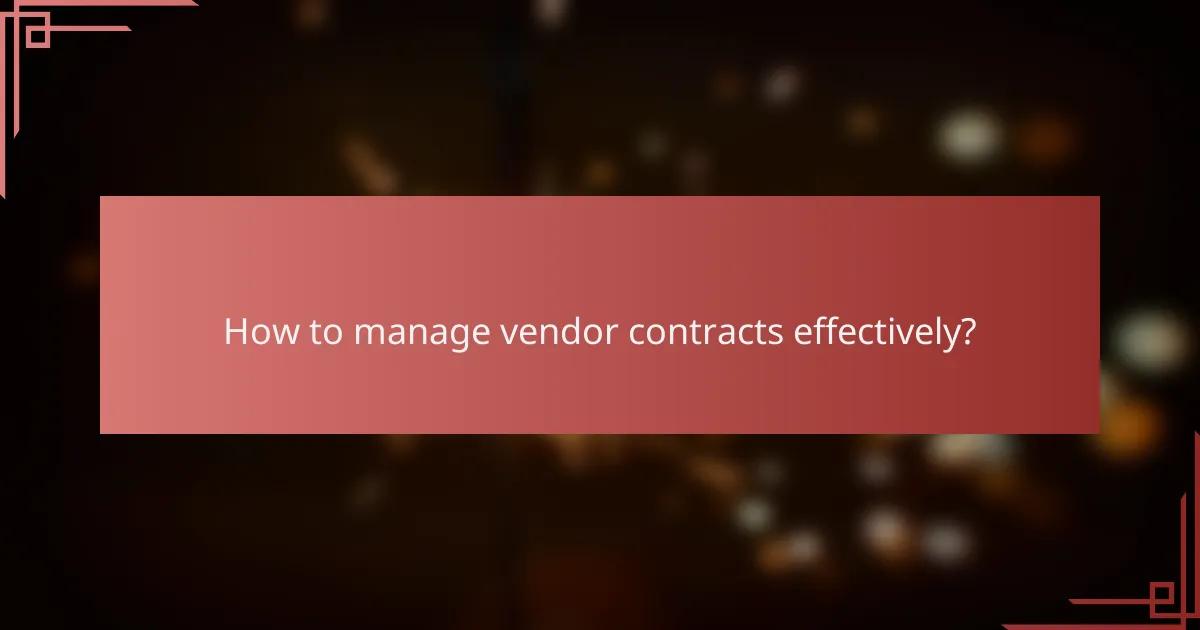
How to manage vendor contracts effectively?
Managing vendor contracts effectively involves organizing, monitoring, and optimizing agreements to ensure compliance and satisfaction for both parties. Key practices include utilizing software tools, understanding contract terminology, negotiating favorable terms, and consistently monitoring deliverables.
Use contract management software
Contract management software streamlines the process of creating, storing, and tracking vendor contracts. These tools often include features for reminders, compliance checks, and document sharing, which can save time and reduce errors.
Popular options include platforms like DocuSign, ContractWorks, and Agiloft, which cater to various business sizes and needs. Investing in such software can enhance efficiency and provide a centralized location for all contract-related documents.
Understand key contract terms
Familiarity with essential contract terms is crucial for effective management. Key terms include scope of work, payment schedules, termination clauses, and confidentiality agreements. Understanding these elements helps prevent misunderstandings and disputes.
For instance, knowing the payment terms can clarify when and how much to pay vendors, while understanding termination clauses can protect your organization from unexpected liabilities. Always review these terms carefully before signing.
Negotiate favorable terms
Negotiating favorable terms can significantly impact the success of vendor relationships. Aim for terms that align with your organization’s goals, such as flexible payment options or performance incentives.
Consider preparing a checklist of must-have terms and areas where you can compromise. Engaging in open discussions with vendors can lead to mutually beneficial agreements, fostering long-term partnerships.
Monitor compliance and deliverables
Regularly monitoring compliance and deliverables ensures that vendors meet their contractual obligations. Set up a system for tracking key performance indicators (KPIs) related to the contract, such as delivery timelines and quality standards.
Establishing a schedule for regular check-ins can help address issues promptly and maintain a positive working relationship. Document any discrepancies and communicate them to the vendor to facilitate resolution and uphold accountability.
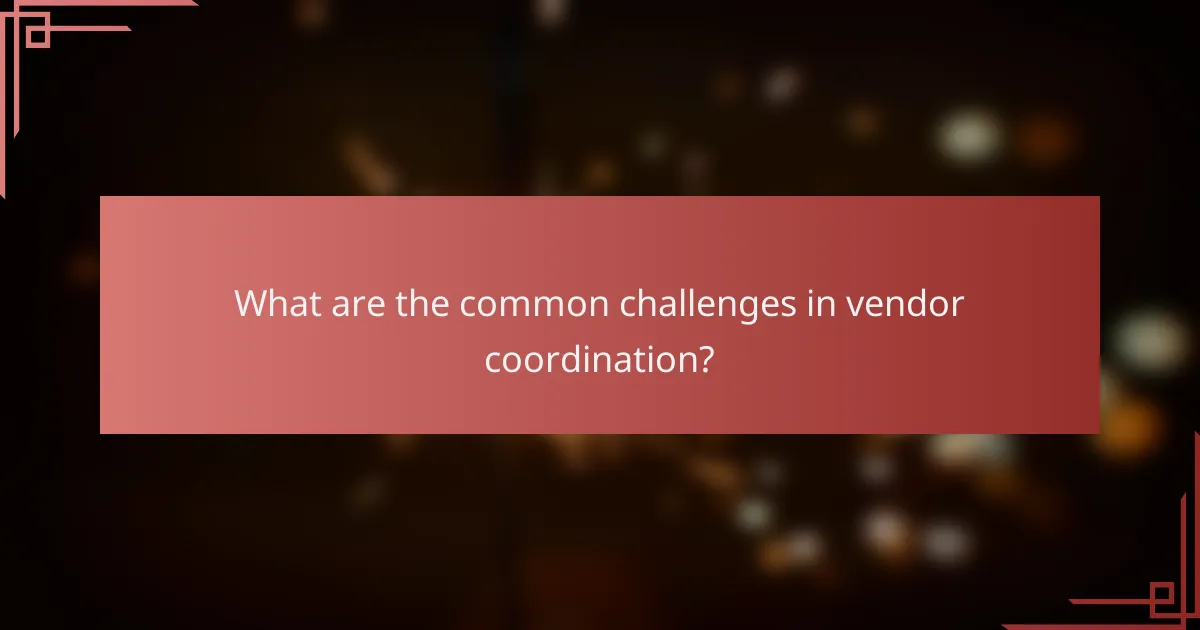
What are the common challenges in vendor coordination?
Vendor coordination often faces challenges that can disrupt event planning and execution. Key issues include miscommunication, scheduling conflicts, budget overruns, and last-minute changes, all of which require careful management to ensure a successful community celebration.
Miscommunication and misunderstandings
Miscommunication can lead to significant problems in vendor coordination. Clear and consistent communication is essential to ensure that all parties understand their roles, responsibilities, and expectations. Utilizing tools like shared documents or project management software can help keep everyone on the same page.
To minimize misunderstandings, establish regular check-ins and confirm details in writing. For example, if a vendor is providing catering, confirm the menu, number of guests, and delivery times well in advance.
Scheduling conflicts
Scheduling conflicts often arise when multiple vendors are involved, each with their own timelines and availability. To avoid this, create a detailed event timeline that outlines when each vendor is expected to arrive and complete their tasks.
Consider using a shared calendar to keep track of all vendor schedules. This can help identify potential overlaps and allow for adjustments before they become issues. Always have a backup plan in case a vendor cannot meet their scheduled time.
Budget overruns
Budget overruns can occur when vendors exceed their initial estimates or when unexpected costs arise. To manage this, establish a clear budget for each vendor and include a contingency fund of around 10-15% to cover unforeseen expenses.
Regularly review vendor invoices against the agreed-upon budget and communicate any discrepancies immediately. This proactive approach can help prevent financial surprises as the event date approaches.
Last-minute changes
Last-minute changes can disrupt vendor coordination and lead to chaos. Whether it’s a change in the event location or a shift in the number of attendees, having a flexible plan is crucial. Ensure that all vendors are aware of the possibility of changes and have a process in place for communicating these adjustments.
To mitigate the impact of last-minute changes, establish clear protocols for how changes will be communicated and handled. This could include a designated point person for all vendor communications to streamline the process and reduce confusion.
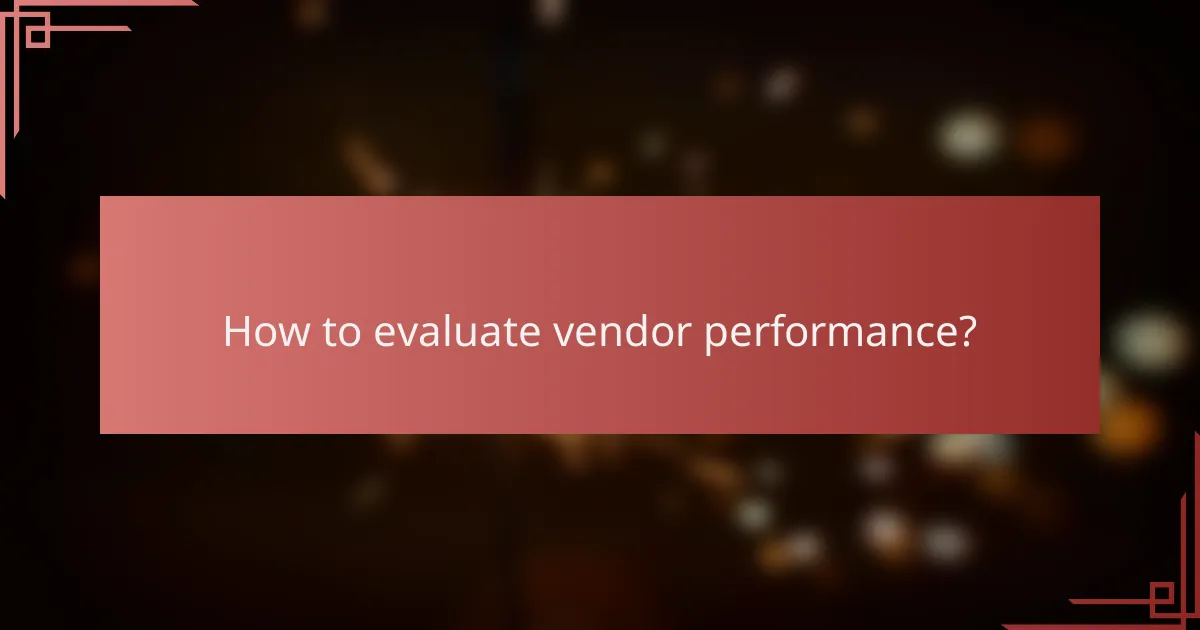
How to evaluate vendor performance?
Evaluating vendor performance involves assessing their reliability, quality of service, and adherence to contract terms. This process ensures that vendors meet expectations and contribute positively to community celebrations.
Key performance indicators (KPIs)
Key performance indicators (KPIs) are essential metrics for evaluating vendor performance. Common KPIs include delivery timeliness, quality of products or services, responsiveness to inquiries, and adherence to budget constraints. Establishing clear KPIs at the outset helps in objectively measuring vendor effectiveness.
Feedback collection
Collecting feedback from stakeholders is crucial for assessing vendor performance. This can include gathering input from event attendees, staff, and other vendors. Surveys or informal discussions can provide valuable insights into the vendor’s strengths and areas for improvement.
Regular performance reviews
Conducting regular performance reviews allows for ongoing assessment of vendor contributions. Schedule meetings or check-ins throughout the planning process to discuss progress and address any issues. This proactive approach fosters better communication and helps maintain high standards.
Documentation and reporting
Maintaining thorough documentation is vital for evaluating vendor performance. Keep records of contracts, communications, and performance assessments. This documentation can serve as a reference for future events and help in making informed decisions about vendor selection.
